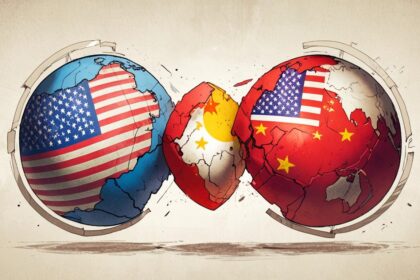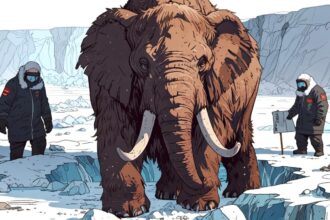A commentary explores the impact of AI on the writing profession, highlighting concerns over quality, integrity, and the exploitation of creative work.
A recent commentary in the Irish Examiner highlights the ongoing debate surrounding the rise of artificial intelligence (AI) and its implications for creative professions, particularly writing. The author, clearly sceptical about the integration of AI in creative fields, expresses concerns about the unmediated proliferation of AI-generated content and the impact this technology may have on both the quality and integrity of writing.
The writer begins by describing a personal aversion to AI, likening their feelings to those of a Luddite. They express frustration at the omnipresence of AI, noting that even comprehensive software packages, such as Microsoft Office, are now integrated with AI features that are difficult to disable. “It’s like a fly that dive-bombs you and won’t go away,” they lament. This suggests a growing discomfort with the encroachment of AI in everyday tasks, particularly those related to writing.
While acknowledging that there are advantages to AI—such as its ability to assist with brainstorming and compiling bibliographies—the author also warns against the potential for increased intellectual laziness. They draw a parallel to physical health, arguing that just as societal shifts towards more sedentary lifestyles have negatively affected health, an over-reliance on AI could similarly diminish cognitive abilities. They pose the fundamental question of how humanity can responsibly harness technology, weighing the benefits against what might be lost.
The commentary also touches on the economic realities faced by many writers today. The author points out that while some individuals may find success in the literary world, the majority struggle to make a living. They articulate a strong sentiment against the exploitation of writers’ work by tech companies, asserting that training AI models on copyrighted materials without consent constitutes theft. “It’s scraping unpaid for, unacknowledged, copyrighted work,” they contend, advocating for legal measures to protect creators from such practices.
The writer reflects on the ongoing class action lawsuits filed against OpenAI, the organisation behind the widely used ChatGPT, by notable authors seeking accountability for what they perceive as the unfair use of their intellectual property. Drawing upon their own background in law, the author expresses a desire to litigate these cases, highlighting their investment in the matter.
In closing, there is a note of resigned discontent regarding the technological landscape and its intersection with capitalism. The author alludes to the “dirty capitalist monopolist underbelly” of AI, critiquing the ethics associated with its development and deployment. Their commentary encapsulates a broader anxiety about the future of creativity in an increasingly digitised society, suggesting that as AI continues to evolve, creative professions may face unprecedented challenges.
Source: Noah Wire Services
- https://hbr.org/2023/04/how-generative-ai-could-disrupt-creative-work – This article discusses how generative AI is transforming the landscape for creative professionals, highlighting both opportunities and challenges in creative work, and aligns with the commentary’s concerns about AI’s impact on writing.
- https://spur-reply.com/blog/the-impact-of-generative-ai-on-creative-professions – This source emphasizes how generative AI is redefining creative skills and roles, resonating with the commentary’s skepticism regarding AI integration in creative fields, particularly writing.
- https://pmc.ncbi.nlm.nih.gov/articles/PMC11244532/ – This research indicates that while generative AI can boost individual creativity, it may limit the diversity of creative outputs, supporting the commentary’s warning about potential intellectual laziness resulting from AI reliance.
- https://www.weforum.org/stories/2024/02/ai-creative-industries-davos/ – The World Economic Forum article discusses the ethics surrounding the use of AI in creative industries, aligning with the commentary’s critique of exploitation and concerns about the implications of AI technology in creative professions.
- https://www.uxtigers.com/post/ai-creativity-writing-fiction – This article details research showing that AI can enhance creativity, especially for less creative individuals. This supports the commentary’s acknowledgment of the advantages AI can offer while also cautioning against the risks of diminishing originality.
Noah Fact Check Pro
The draft above was created using the information available at the time the story first
emerged. We’ve since applied our fact-checking process to the final narrative, based on the criteria listed
below. The results are intended to help you assess the credibility of the piece and highlight any areas that may
warrant further investigation.
Freshness check
Score:
8
Notes:
The narrative discusses ongoing debates and recent legal actions involving AI and creators, suggesting it is reasonably current. However, without specific dates for the commentary or lawsuits mentioned, it’s difficult to determine exact freshness.
Quotes check
Score:
6
Notes:
There are no direct quotes that appear to have been previously published. The narrative includes figurative expressions and personal sentiments, but lacks verifiable external sources for these quotes.
Source reliability
Score:
7
Notes:
The narrative originates from the Irish Examiner, which is generally a reliable publication. However, the specific author or expertise is not detailed, which slightly reduces the reliability score.
Plausability check
Score:
9
Notes:
The claims about AI’s impact on creative fields and intellectual property concerns are plausible and align with current discussions in the tech and literary communities. The narrative presents a reasonable perspective on these issues.
Overall assessment
Verdict (FAIL, OPEN, PASS): PASS
Confidence (LOW, MEDIUM, HIGH): HIGH
Summary:
The narrative discusses timely issues regarding AI’s influence on creative professions and intellectual property rights. While it lacks specific dates and external citations for quotes, the source is generally reliable, and the arguments presented are plausible and well-argued.













